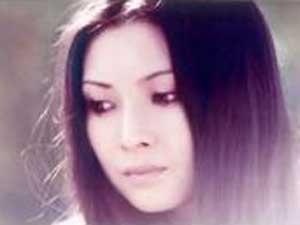 Kaji Meiko received the Kinema Jumpo Award (the Japanese Oscar) as best actress for her 1978 performance in Sonezaki shinju, or Double Suicide at Sonezaki, opposite Ryudo Uzaki at the time best known as a rock performer but who truly rises to the occasion of a fine film. Kaji Meiko received the Kinema Jumpo Award (the Japanese Oscar) as best actress for her 1978 performance in Sonezaki shinju, or Double Suicide at Sonezaki, opposite Ryudo Uzaki at the time best known as a rock performer but who truly rises to the occasion of a fine film.
This was Kaji's absolute favorite of all the films she ever appeared in, but as an independent production funded with grants, it never had great distribution because major studios controlled the theaters, & it never made its money back.
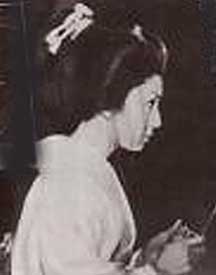 Despite the film's acclaim among critics, offers of such classy roles did not roll in for Kaji who remains to this day associated with sexploitation films rather than artistic treasures like Double Suicide at Sonezaki. Despite the film's acclaim among critics, offers of such classy roles did not roll in for Kaji who remains to this day associated with sexploitation films rather than artistic treasures like Double Suicide at Sonezaki.
Director Yasuzo Masumura also did the s/m cult classic Blind Beast, but his exploitation style is not used for Double Suicide at Sonezaki, which affects an almost Shakespearean seriousness of tragedy.
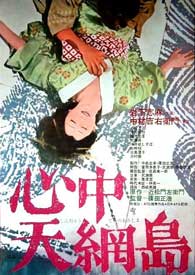 The tale based on a popular doll play by Monzaemon Chikamatsu (1653-1725) was first adapted to the screen in the silent era by Teinosuke Kunugasa as Shinju yoimachigusa (1925), which alas doesn't survive. The tale based on a popular doll play by Monzaemon Chikamatsu (1653-1725) was first adapted to the screen in the silent era by Teinosuke Kunugasa as Shinju yoimachigusa (1925), which alas doesn't survive.
It is also the source for Masahiro Shinoda's experimentally surreal Double Suicide (Shinju: Ten no amijima, 1969). It takes the story quite a different direction, with a paper merchant Jihei (Kichiemon Nakamura) falling for a woman of the gay quarters, leading to the final tragedy of shinju or love-sucide. Shima Iwashita plays both the suffering wife who is cheated upon, & the courtesan.
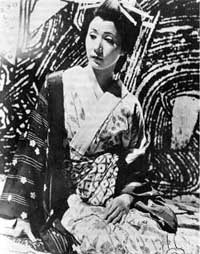 In the original bunraku puppet play, puppeteers wear black hoods as they move the suprisingly articulated & real-seeming puppets. In Shinoda's widely & wisely praised adaptation, the hooded puppeteers are retained despite that the story is played by living actors. No one within the film takes any notice of the puppeteers who move them about. This has the effect of making the inevitable double suicide of the lovers seem all the more fated, due to invisible presences. It lends a mood of mystic horror to the tragedy. In the original bunraku puppet play, puppeteers wear black hoods as they move the suprisingly articulated & real-seeming puppets. In Shinoda's widely & wisely praised adaptation, the hooded puppeteers are retained despite that the story is played by living actors. No one within the film takes any notice of the puppeteers who move them about. This has the effect of making the inevitable double suicide of the lovers seem all the more fated, due to invisible presences. It lends a mood of mystic horror to the tragedy.
Shinoda's film is a surreal masterpiece, but the comparatively overlooked version by Masumura is also a fine vastly more realistic adaptation of the well known play regarding doomed lovers who are often regarded as the Japanese Romeo & Juliette. Shinoda's version for its experimentality has a comparatively tepid emotional impact. Masamura's version goes for the jugular with heroic anguish, & I believe it's the better of two fine films.
Kaji Meiko is best known in the west for her two revenge films where she plays Lady Snowblood, with a secondary following for her earliest films, demeaning sexploitation films such as the Female Convict Scorpion series. Her best work after Lady Snowblood remains practically unknown in the west.
In Double Suicide of Sonezaki she is at the height of her physical beauty. When the starcrossed lovers get to the climactic suicide scene, it is stretched out & stretched out in lurid detail & their white garments are totally encrimsoned by the time they have finished the horrific chore. Yet it does not play out hammy or exploitative. It possesses the saddest most edge-of-the-seat intensity of emotion, a bloody tearjerker infused with aesthetic gorgeousness that leaves the viewer awed & drained.
As I write this review, the award-winning 1978 film is not to be available on VHS or DVD, though a rarely exhibited 35 mm subtitled print exists. It's to be hoped some enterprising DVD distributor soon brings this excellent Kaji Meiko vehicle back into the light, especially given the revival of interest in her inspired by Quentin Terantino's Kill Bill.
copyright © by Paghat the Ratgirl
|
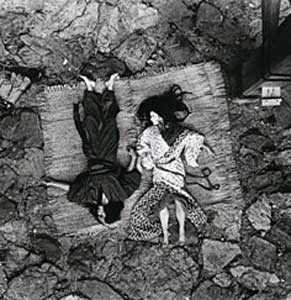
 Kaji Meiko received the Kinema Jumpo Award (the Japanese Oscar) as best actress for her 1978 performance in Sonezaki shinju, or Double Suicide at Sonezaki, opposite Ryudo Uzaki at the time best known as a rock performer but who truly rises to the occasion of a fine film.
Kaji Meiko received the Kinema Jumpo Award (the Japanese Oscar) as best actress for her 1978 performance in Sonezaki shinju, or Double Suicide at Sonezaki, opposite Ryudo Uzaki at the time best known as a rock performer but who truly rises to the occasion of a fine film. Despite the film's acclaim among critics, offers of such classy roles did not roll in for Kaji who remains to this day associated with sexploitation films rather than artistic treasures like Double Suicide at Sonezaki.
Despite the film's acclaim among critics, offers of such classy roles did not roll in for Kaji who remains to this day associated with sexploitation films rather than artistic treasures like Double Suicide at Sonezaki.
 In the original bunraku puppet play, puppeteers wear black hoods as they move the suprisingly articulated & real-seeming puppets. In Shinoda's widely & wisely praised adaptation, the hooded puppeteers are retained despite that the story is played by living actors. No one within the film takes any notice of the puppeteers who move them about. This has the effect of making the inevitable double suicide of the lovers seem all the more fated, due to invisible presences. It lends a mood of mystic horror to the tragedy.
In the original bunraku puppet play, puppeteers wear black hoods as they move the suprisingly articulated & real-seeming puppets. In Shinoda's widely & wisely praised adaptation, the hooded puppeteers are retained despite that the story is played by living actors. No one within the film takes any notice of the puppeteers who move them about. This has the effect of making the inevitable double suicide of the lovers seem all the more fated, due to invisible presences. It lends a mood of mystic horror to the tragedy.